实义动词的一般疑问句及其回答 配套课件
英语一般疑问句的知识pptppt课件

精选ppt课件2021
11
Eg4. 问句: Do your parents like English?
肯答: Yes,they do. 否答: No,they don’t.
精选ppt课件2021
12
三、一般疑问句的回答
精选ppt课件2021
13
正如前面所述,回答一般疑问句时有肯定回答和 否定回答两种方式,肯定回答以Yes起句,否定 回答用No开头。但对一般疑问句的回答也不是 一成不变的。肯定回答还可以用OK./Certainly. 等;否定回答可用Sorry./Sorry,I can`t.等。
精选ppt课件2021
17
五、如何将陈述句变为一般 疑问句?
精选ppt课件2021
18
根据一般疑问句不同的家族,可以 用不同的方法将陈述句变为相应的一 般疑问句。
精选ppt课件2021
19
1、第一家族:含be动词或情态动词的句子
秘诀:一调二改三问号
一调:即把句中的be或情态动词调到主语前;
精选ppt课件2021
7
Eg3. 问句: Can you speak English? 肯答: Yes,I can. 否答: No,I can’t.
精选ppt课件2021
8
注意例句1和例句2,在回答时必须将 this\that与these\those分别变为it和 they。
精选ppt课件2021
9
另一家族为含行为动词(或称为实义 动词)的一般疑问句,其结构为:
助动词 + 主语 + 动词原形 + 其它
精选ppt课件2021
10
肯定回答用“Yes, 主语+ do\does.”, 否定回答用“No, 主语+don\does not.”。助动词也常用缩写形式,主要 有don’t,doesn’t,didn’t等。
实义动词一般疑问句

实义动词一般疑问句1•实义动词(行为动词):有实际意义,表示实际动作的动词。
2. 肯定句:主语(第三人称单数)+行为动词(三单)+名词第三人称单数:she,he,it,名词单数,人名,不及物动词例如:I have a pen. He has a pen.3. 否定句:主语(第三人称单数)+don't (doesn')+行为动词+名词例如:I don't have a pen. He doesnthave a pen.4. 一般疑问句:Do (Does)+主语(第三人称单数)+行为动词+名词?例如:Do you have a pen? Does he have a pen?5. 肯否回答:Yes 主语+do (does)No,主语+do n't (does n't 例如:Yes I do./No, I don't. Yes, he does./No, he doesn. 6. do,does称为助动词,无实际意义例如:1.肯定句:I have a pen cil.否定句:I don't have a pen cil.一般疑问句:Do you have a pen cil?肯否回答:Yes,l do. No, I don '.2.冃疋句:She has a schoolbag.否定句:She does n'thave a schoolbag.一般疑问句:Does she have a schoolbag?肯否回答:Yes, she does. No, she does n't.练习:1. 我有一个飞机模型。
肯定句:____________________________________________否定句:____________________________________________一般疑问句:________________________________________肯否回答:____________________________________________2. 他有一个书架。
小学语法一般疑问句及回答解析(二年级)课件

3. They like fish. ______________
4. Jerry and Mary like ____________ meat.
学习交流PPTBiblioteka 11归 纳:肯定句 句
be动词
can 提前
like 词do提前
学习交流PPT
一般疑问句 把be动词提前
把can
把助动
12
More practice
We like...
They like...
Do you like...? Do you like ...?
Do they like...?
学习交流PPT
10
肯定句 1. I like singing.
一般疑问句 肯回,否回 ______________
2. We like reading. ______________
1. I am in Pudong. ________________ 2. We are hungry. ________________ 3. That’s an umbrella. _______________ 4. My sisters are playing. ______________ 5. Peter can hear a ship. ________________ 6. We can see a fast train. ________________ 7. I like strawberries. ________________ 8. We like flying kites. _________________ 9. They like swimming together. ________________
一般疑问句PPT

疑问句的分类
一般疑问句
以疑问词开头,结尾用问号,通常用于询问 事实或信息,需要对方作出肯定或否定回答 。
选择疑问句
提出两个或多个选项供对方选择,通常以“or”连 接。
特殊疑问句
以疑问词开头,结尾用问号,通常用于询问 特定的人、事、物等,需要对方提供具体的 信息。
询问信息
询问事实
一般疑问句常用于询问事实或信 息,例如“你来自哪个国家?” 或“明天天气怎么样?”。
寻求建议
在寻求建议或帮助时,一般疑问 句也经常被使用,例如“我应该 穿什么衣服?”或“我应该怎么 做?”。
了解情况
在了解某个情况或状况时,一般 疑问句也是常用的表达方式,例 如“这个电影什么时候上映?” 或“这个地方怎么去?”。
一般疑问句
目录
CONTENTS
• 一般疑问句的定义 • 一般疑问句的构成 • 一般疑问句的回答 • 一般疑问句的用法 • 一般疑问句的注意事项
01 一般疑问句的定义
什么是疑问句
疑问句是一种句式,用于提出疑问或 询问信息,通常以疑问词(如 “what”、“where”、“when” 、“how”等)开头。
请求确认
确认信息
当我们需要确认对方是否拥有某些信息时, 一般疑问句可以用来请求确认,例如“你确 定这是正确的答案吗?”或“你记得那个人 的名字吗?”。
确认事实
当我们想要确认某个事实是否正确时,一般 疑问句也可以用来请求对方确认,例如“你 确定明天是星期五吗?”或“你记得我上次 是什么时候来的吗?”。
要点二
避免使用否定疑问词
在一般疑问句中,应避免使用否定疑问词,因为这可能会 引起歧义或误解。
实义动词一般疑问句和否定句公开课获奖课件百校联赛一等奖课件
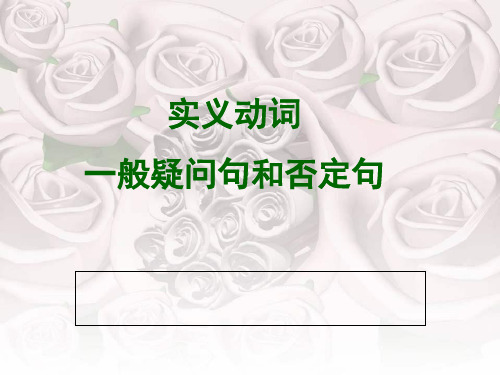
他旳父母有诸多钱吗? Yes, they do. No, they don't. They have a volleyball. 他们有一种排球. Do they have a volleyball? 他们有一种排球吗?
Yes, they do. No, they don't.
翻译下列句子,并变为一般疑问句,并作肯定和否 定回答。
1. 我有三个排球。
2. 我们有某些乒乓球拍。
3. 她有一件漂亮旳夹克衫。
4. 爱丽丝有一条可爱旳(cute)旳小狗。
1. 5.杰克旳朋友们有某些书。 2. 6.汤姆有一本英语字典。 3. 7.我们旳李老师有一种漂亮旳女朋友。 4. 8.你们有一种棒球。
汉译英。
1. 我没有一种排球。 2. 那只狗没有左眼(left eye). 3. 我有一种宝宝,但是你们没有。 4. 李老师有一种篮球吗? 5. 那个女孩有一顶漂亮旳帽子。 6. 他们没有乒乓球拍,但是有一种乒乓球。 7. 何亚东有一种篮球,也有两块乒乓球拍。
My parents have lots of money. 我旳父母有诸多钱. My parents don't have lots of money. 我旳父母没有诸多钱.
They have a volleyball. 他们有一种排球. They don't have a volleyball. 他们没有一种排球.
人教版(PEP)一般疑问句讲解课件共18张PPT
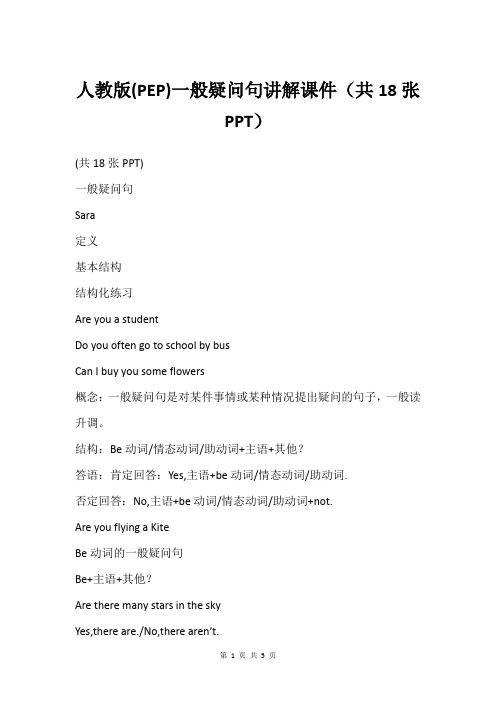
人教版(PEP)一般疑问句讲解课件(共18张PPT)(共18张PPT)一般疑问句Sara定义基本结构结构化练习Are you a studentDo you often go to school by busCan I buy you some flowers概念:一般疑问句是对某件事情或某种情况提出疑问的句子,一般读升调。
结构:Be动词/情态动词/助动词+主语+其他?答语:肯定回答:Yes,主语+be动词/情态动词/助动词.否定回答:No,主语+be动词/情态动词/助动词+not.Are you flying a KiteBe动词的一般疑问句Be+主语+其他?Are there many stars in the skyYes,there are./No,there aren’t.Is he your fatherYes,he is./No,he isn’t.助动词的一般疑问句助动词(Do/Does/Did)+主语+其他?Do you go to school by busYes,I do./No,I don’t.Does she want any waterYes,she does./No,she doesn’t.情态动词的一般疑问句情态动词(Can/Could/May)+主语+其他?Can you flyYes,I can./No,I can’t.Can he jumpYes,he can./No,he can’t.口诀:有be提be,有情提情,无be无情,助动词do,does,did来帮忙,遇到some变any.将下列句子变一般疑问句,并做肯定回答和否定回答。
1 He has a toothache.2 I am on the farm now.3 I can dance beautifully.Does he have a toothacheYes,he does./No,he doesn’t.Are you on the farm nowYes,I am./No,I am not.Can you dance beautifullyYes,I can./No,I can’t.练习1 -_____your sister________ a ping-pong hat?-Yes,she does.A Do,haveB Does,hasC Does,have2 -Do I have to make dinner-____________.A Yes,you do.B No,you can’t.C No,I don’t.D Yes, I do.3 -__________she ready to help people at any time-Yes,she_________.A Is,doesB Does,doesC Does,isD Is,is4 Wang Wei never______the plane to the USA.A byB takesC takeD on5 -Does Jenny usually______her homework in the evening-No,she usually_________it after school.A does,doB do,doesC does,doesD do,do6 -Can you cook the meal-_________.A No,I don’tB No, I can’t.C Yes,you can.用所给动词的适当形式填空,每空一词。
一般疑问句ppt课件

.
注意: 1.遇 I(我)/we(我们)—you(你/你们)
Eg:陈述句:We are happy. 一般疑问句:Are you happy?
2.my(我的)—your(你的) Eg:陈述句:I am going to visit my grandparents this Sunday. 一般疑问句:Are you going to visit your grandparents this Sunday?
.
陈述句变一般疑问句:2.句子中有情态动词(can) 的,把情态动词提到句首。
一提、二变、三问号
Can Tthheeyycan play football ?.
.
Exercises2
1. I can skate . 2. _C_a_n____y_o_u___skate?
2.She can sweep the floor. __C__a_n__ _s_h_e__sweep the floor?
? Is Hhe is a student . 一提、二变、三问号
? Are Tthheeyy are teachers .
一提、二变、三问号
Are Tthheerree areasnoyme apples on the desk.?
.
Exercises1
1) I am from China. __A_r_e_ ___y_o_u__ from China?
.
一般疑问句做肯定,否定回答
Are you a student?
肯定回答:Yes , I am. 否定回答:No, I’m not.
肯定回答: Yes , 主+be动词/can/助.
含实义动词的句子怎样变否定句和一般一般疑问句ppt课件
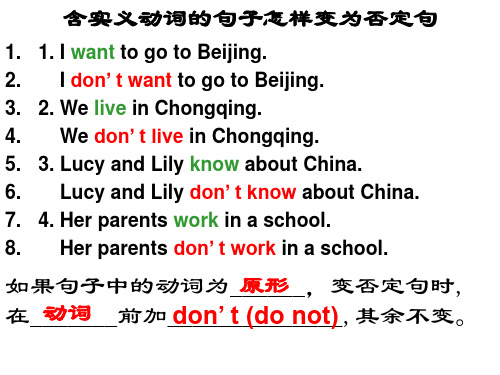
含实义动词的句子怎样变一般疑问句
1.如果句子中的动词
do
为原形,变一般疑问句时, have 在句首加Do,其余不变。
want
2.如果句子中的动词为第 三人称单数形式,变一般 live
如果句子中的动词为_第__三__人__称__单__数__形__式__, 变否定句时,在句首加_D__o_e_s__,然后把动词 变为_原__形___,其余不变。源自含实义动词的句子怎样变否定句
1.如果句子中的动词 do
为原形,变否定句时, have
在动词前加don’ t want
(do not),其余不变。 live
如果句子中的动词为_原__形___,变否定句时, 在_动__词____前加_d_o_n__’ _t _(d__o_n__o_t_) ,其余不变。
含实义动词的句子怎样变为否定句
1. 1. He wants to go to Beijing. 2. He does’ t want to go to Beijing. 3. 2. Peter lives in Chongqing. 4. Peter does’ t live in Chongqing. 5. 3. Lucy knows about China. 6. Lucy does’ t know about China. 7. 4. Her mother works in a school. 8. Her mother does’ t work in a school.
此课件下载可自行编辑修改,供参考! 感谢您的支持,我们努力做得更好!
4. 5. Jane goes to school by bike. 5. Does Jane go to school by bike? 6. Yes, she does. / No, she doesn’ t.
《一般疑问句》课件
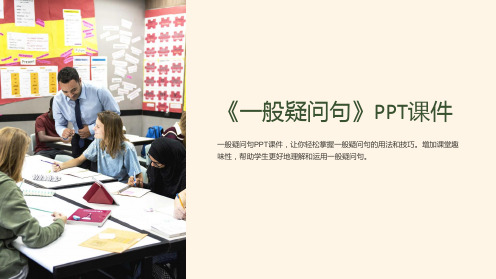
总结
• 一般疑问句用于向他人提问,通过主谓倒装和Yes/No回答。 • 特殊疑问句以特殊疑问词开头,用于询问特定信息。 • 通过练习掌握一般疑问句、Yes/No问答和特殊疑问句的使用。 • 巩固并应用一般疑问句,提高沟通表达能力。
《一般疑问句》PPT课件
一般疑问句PPT课件,让你轻松掌握一般疑问句的用法和技巧。增加课堂趣 味性,帮助学生更好地理解和运用一般疑问句。
什么是一般疑问句?
1 定义
2 重要性
一般疑问句是用于向对方提问的句型,通 过倒装询问陈述句的真实性或肯定/否定的 回答。
学习一般疑问句有助于提高语言表达能力, 使对话更加生动有趣。
一般疑问句的句型结构
1
基本句型
一般疑问句的基本句型是:助动词 +
主谓倒装
2
主语 + 谓语。
当主语为第三人称单数,或以非be动
词开头时,需要将主语和谓语进行倒
ห้องสมุดไป่ตู้装。
3
示例
一般疑问句的示例:Are you ready? Can he swim? Did they finish the project?
Yes/No问答
1 回答方式
Yes/No问答是对一般疑问句进行肯定或否定回答,可以直接简略回答或使用完整句子回 答。
2 缩略回答
缩略回答只使用动词和be动词“是”或“不是”的形式,如“Yes, I am.” 或“No, he isn't.”
特殊疑问句
1 定义
特殊疑问句是用于询问特定信息的句型,常以特殊疑问词开头。
2 句型结构
特殊疑问句的句型结构是:特殊疑问词 + 助动词(be动词) + 主语 + 谓语(其它动词)。
小学语法一般疑问句及回答解析(二年级)ppt课件
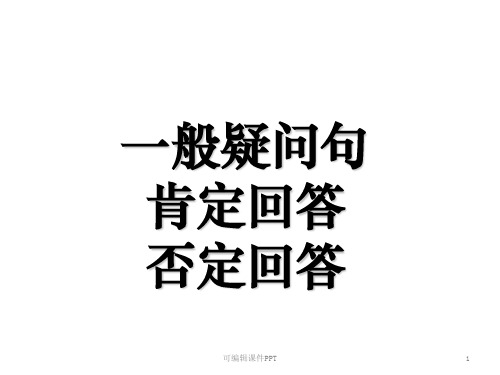
3. They like fish. ______________
4. Jerry and Mary like ____________ meat.
可编辑课件PPT
11
归 纳:
肯定句 疑问句句
be动词 词提前
can 把can 提前
可编辑课件PPT
一般 把be动
12
More practice
1. I am in Pudong. ________________ 2. We are hungry. ________________ 3. That’s an umbrella. _______________ 4. My sisters are playing. ______________ 5. Peter can hear a ship.
Jim is six.
Is Jim six?
可编辑课件PPT
Yes, he is. 肯定回答
No, he isn’t.否定回答
2
肯定句
一般疑问句
They are kind. Are they kind?
肯定回答:Yes, they are.
否定回答:No, they aren’t.
I am helpful. Are you helpful?
Can they ride?
肯定回答:Yes, they can. No, 可编辑课件P否PT 定回答: they can’t.6
肯定句 变 一般疑问句
1. 看到can, 就把can提前, 句尾加问号
2. 如果是 I can或 We can, 一般整体改为Can you...?
Eg. I can swim. Can you swim? We can swim. Can you swim?
《一般疑问句及回答》课件

如何回答否定情况下的问题
当回答否定情况下的问题时,使用“No”加上否定词作为回答。
特殊疑问句是什么
特殊疑问句是用来询问特定信息的句子,通常以疑问词开头。
特殊疑问句的例子
特殊疑问句的例子包括:“你是谁?”、“你在做什么?”、“你为什么这么做?”等等。
《一般疑问句及回答》 PPT课件
了解什么是一般疑问句以及其结构,学会正确回答肯定和否定情况下的问题, 还有特殊疑问句的例子和回答方法。
一般疑问句是什么Байду номын сангаас
一般疑问句是用来询问陈述句的真实性或正确性的句子。
一般疑问句的结构
一般疑问句的结构是将助动词或系动词提前到主语之前,然后进行倒装。
如何回答肯定情况下的问题
如何回答特殊疑问句
回答特殊疑问句时,需要根据疑问词提供具体的信息或解释。
一般疑问句和特殊疑问句课件
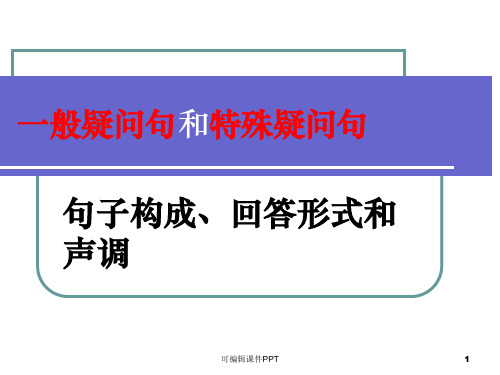
He can swim now. → Can he swim now﹖
可编辑课件PPT
7
注意事项 陈述句变一般疑问句:
3.陈述句中只有一个实义动词作谓语。 当时态为一般现在时,变为一般疑问句时 要在句首加do或does, 主语后的实义动 词用原形。当时态为一般过去时,变为一 般疑问句时要在句首加did, 主语后的实 义动词用原形。如:
Did he go to Guangzhou yesterday?
可编辑课件PPT
9
特殊疑问句
以疑问词开头: what, who, whose, which, when, where, why, how, how many, how much, how old 等。 (1) Where are you from? (2) Who is he? (4) How many girls are there in your class? (5) Which film star do you like best?
一般疑问句和特殊疑问句
句子构成、回答形式和 声调
可编辑课件PPT
1
一般疑问句
一般疑问句是疑问句的一种。
定义: 它是指用yes(是)或no (否)来回答的句子。
可编辑课件PPT
2
一般疑问句
(1) Is Han Mei in Class Four? (2) Can you spell your name, please? (3) Does he go to school every day?
翻译练习
1. 你们喜欢英语吗?
2. 我真的需要这些规则吗?
一般疑问句PPT教学课件
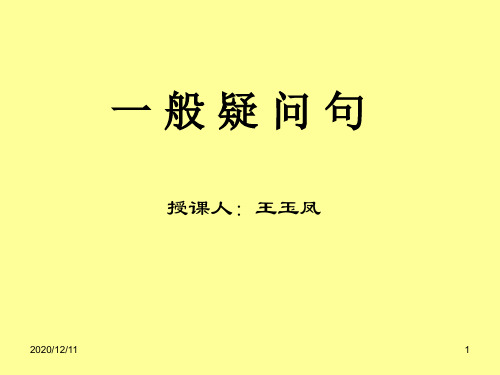
3. I like playing the piano. 4.I’m a student.
Do you like playing the piano.
Are you a student?
Yes, I do. No, I don’t.
2020/12/11
4
请你仔细观察演变过程:
• 1.He is in the sixth grade.
Is 2.
he in the sixth grade?
3.They are dogs.
4. Are they dogs?
2020/12/11
5
我来做一做:
把下列句子变成一般疑问句:
• 1.Xiaoxiao is the best singer.
• Is Xiaoxiao the best singer? 2. He is a drum player.
Is he a drum player? 3.She can sing English songs.
Can she sing English songs?
2020/12/11
6
这道题有点难:
• Can和be,往前提, • 遇见I、We变成you, • Am跟着变成are, • 两答时候变回来。 • 没有遇见Can和be, • Do或Does加在前。
2020/12/11
9
一般疑问句的回答:
• 请记住两点:
1.先用yes或no来回答。 2.问谁答谁
2020/12/11
10
例1:
• Is he a drummer?
肯定回答: Yes, I can.
否定回答:
七上unit5含实义动词的句子怎样变否定句和一般一般疑问句.ppt

实义动词一般现在时的句型
句型形式 句型结构
例句
肯定句
主语+实义动词 +… He likes English.
否定句
主语+don't /
A. have; have
B. have; has
C. has; has
D. has; have
( )2. —Does Lucy look like Lily?
—Yes, she ____. They ____ the same.
A. does; looks
B. does; look
C. do; looks
实义动词第三人称单数变化规则
规则
举例
读音变化
大部分动词后 直接加s
like—likes live-lives
以s, ch, sh, x, o结尾 的动词后es
teach—teaches wash—washes guess—guesses fix—fixes go—goes /z/
以辅音字母 +y结尾 fly—flies 的动词,变 y为i加es carry---carries 以元音字母 +y结尾 play—plays 的动词,词尾加 s enjoy—enjoys
I go to school at 7:00 every day.
2.目前的爱好、能力等
She likes swimming very much.
3.客观事实
Fish live in water.
七年级英语一般疑问句课件ppy

2021/10/10
6
❖ 总结:1.人称的变化:原句中是 I 的要变为 you(你), 是 we 的要变为You(你们); 是my 的要变为your(你的),原句中是our ( 我们的)要改为your (你们的)。
❖ 2. 加助动词do的某种形式构成的一般疑问 句,在回答时不能使用原句中的谓语动词 (即行为动词)来作答,而是要使用助动 词来作答。
❖ 一般疑问句肯定回答用“yes ” , 否定回答用 “ no ” . 注意在肯定回答时,Yes后面的部 分不能缩写。如it is, 不能缩写为 it’s . he is 不能缩写为he’s ,she is 不能缩写为she’s…
❖ She is a teacher .
❖ Is she a teacher ?
❖ Yes , she is . No, she is not \ isn’t.
2ctionary.
❖ Is this your dictionary ?
❖ Yes, it is . No , it is not \ isn’t. ❖ 注意:对疑问句中的指示代词this, that 在回
❖ 3.do (does, did ): does 用于第三人称单数, did用于一般过去时)
❖ 4.行为动词,又叫实义动词,在句中可以独 立充当谓语。
❖ 注意:行为动词的否定句和疑问句的构成 都新需要加助动词do的某种形式。
2021/10/10
2
❖ 一般疑问句的构成:就是通过把be动词,情 态动词,或助动词提到主语的前面来构成。
2021/10/10
13
2021/10/10
11
❖ 7. I go to work by bike every day. ❖ Do he go to work by bike every day ? ❖ Yes, He does. No, he doesn’t. ❖ 8.she goes to school by bus . ❖ Does she go to school by bus ? ❖ Yes, she does. No, she doesn’t. ❖ 9.I do my homework after school. ❖ Do you do your homework after school ? ❖ Yes, I do. No, I don’t.
- 1、下载文档前请自行甄别文档内容的完整性,平台不提供额外的编辑、内容补充、找答案等附加服务。
- 2、"仅部分预览"的文档,不可在线预览部分如存在完整性等问题,可反馈申请退款(可完整预览的文档不适用该条件!)。
- 3、如文档侵犯您的权益,请联系客服反馈,我们会尽快为您处理(人工客服工作时间:9:00-18:30)。
e.g. Lily does her homework in the evening. Does Lily do her homework in the evening?
知识讲解
如果谓语动词是原型,那么助动词应该是do,变一般疑问句时 应该将do提前。
e.g. Peter goes swimming with his father. Does Peter go swimming with his father?
实义动词的一般疑问句及其回答
知识讲解
The boy is eight years old.
Is the boy eight years old?
The boy likes animals.
?Does the boy like animals?
在一般现在时态里面,如果谓语动词是实义动词,变一般疑问句时 应将助动词do / does提前,末尾打问号。
No, they don’t.
知识小结
陈述句变一般疑问句的时候要把be动词、助动词和 情态动词等提前,末尾用问号;
一般来说,变一般疑问句时应该要把第一人称改成 第二人称;
一般疑问句的肯定和否定回答仍然要借助be动词、 助动词和情态动词,分别用yes和no进行回答。
ห้องสมุดไป่ตู้
即时练习
句型转换: 1. I play basketball every day.(变一般疑问句) Do you play basketball every day? 2. That boy helps the old woman fetch some water. (变一般疑问句)
Does that boy help the old woman fetch any water? 3. Do they go shopping every weekend? (否定回答)
The birds fly to the south in autumn. Do the birds fly to the south in autumn?
知识讲解
在对用实义动词做谓语的一般疑问句进行回答的时候,同样 应该借助助动词do / does。
e.g. ---Do you like seeing films? ---Yes, I do. ---Does Mr. Green read books in the morning? ---No, he doesn’t. He reads in the evening.
